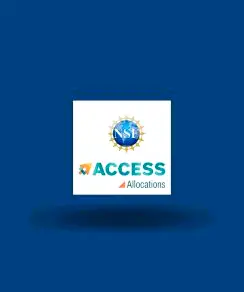The ACCESS program offers advanced computational resources at no cost to U.S.-based researchers and institutions. Funded by the U.S. National Science Foundation, the program removes technical barriers and facilitates the use of high-performance computing for research and educational purposes.
In the academic setting, ACCESS makes its zero-cost services available to students, teaching assistants, instructors and faculty. Technical issues, such as the limitations of personal computers and difficult software installations, can take valuable time away from learning and research. ACCESS offers a solution that allows both students and educators to focus on curriculum and learning.
The program’s core services offer streamlined access to advanced computing. ACCESS provides several major benefits: resources and software are provided at no cost to users; its single interface and catalog simplify class onboarding; no software installation by students is required; dedicated, instructor-managed computing environments are available for classroom use; and allocation requests are processed quickly, with a typical turnaround time of 24 hours.
ACCESS is structured to provide equitable access to powerful computational resources, empowering students to take on tough tasks that would not be possible with a standard laptop. The program is available for any academic project, from class assignments to independent research.
ACCESS for All College Students
Regardless of a person’s school, background, field of study or experience level, all college students have equal access to high-powered computing without financial barriers, red tape or technical difficulty.
A personal laptop is not usually ideal for data-intensive courses. Further, it can be frustrating to try to install the required software for a laptop, with numerous tech problems often occurring. Likewise, for faculty members and teaching assistants, time is valuable—instead of helping students learn and understand curriculum, they may need to spend all their time on tech support.
The mission of ACCESS is to level the playing field and remove the barriers between college students and high-powered computing, with no-cost, shared computational and data resources.
For the Classroom and Campus
Imagine more time for learning and discovery and less time troubleshooting computing issues. ACCESS helps streamline educational routines in the following ways:
- No cost. These resources come at no cost to instructors and students. Even the software programs needed are free to the ACCESS community.
- Simplify classroom onboarding. ACCESS uses just one interface for many resources and tools. This means everyone gets connected quickly and easily.
- No student installs required. Students can quickly find and use available tools through an intuitive catalog, which schools can simply add to their websites.
- Instructor-managed hubs. Instructors can control dedicated student environments, making setup and use easy.
- More power to learn. With powerful ACCESS resources, students can undertake complex and intensive tasks far beyond the capabilities of a standard laptop. This hands-on experience provides critical skills and knowledge that will directly benefit their future careers.
- Students can conduct research. Students can gain meaningful research experience through ACCESS, which is not confined to individuals who already have advanced degrees or who hold professional positions.
- ACCESS handles tech support. Since ACCESS provides centralized tech support, instructors and teaching assistants do not need to field students’ technical questions and troubleshooting issues.
- One platform, numerous users. ACCESS systems support many students simultaneously with almost immediate access. Students can even access files shared by instructors and turn in assignments directly through the system.
Computing that Matters
ACCESS provides instructors and students with a direct path to using computing that matters. When large language models run slowly or simulations demand more processing power, ACCESS is a powerful solution. With approval often available within 24 hours, these resources help classrooms push inquiry boundaries, from data analysis to complex modeling.
Exchange Credits on a Variety of Resources
ACCESS offers four types of projects to choose from, ensuring a great fit for specific needs. Classroom allocations and graduate student projects can choose the EXPLORE project type; once users receive credits, they can use them on any ACCESS resources.
No project is too big or too small. Discover the classroom web page for links to more information.
Agbeli Ameko is the ACCESS outreach coordinator.
